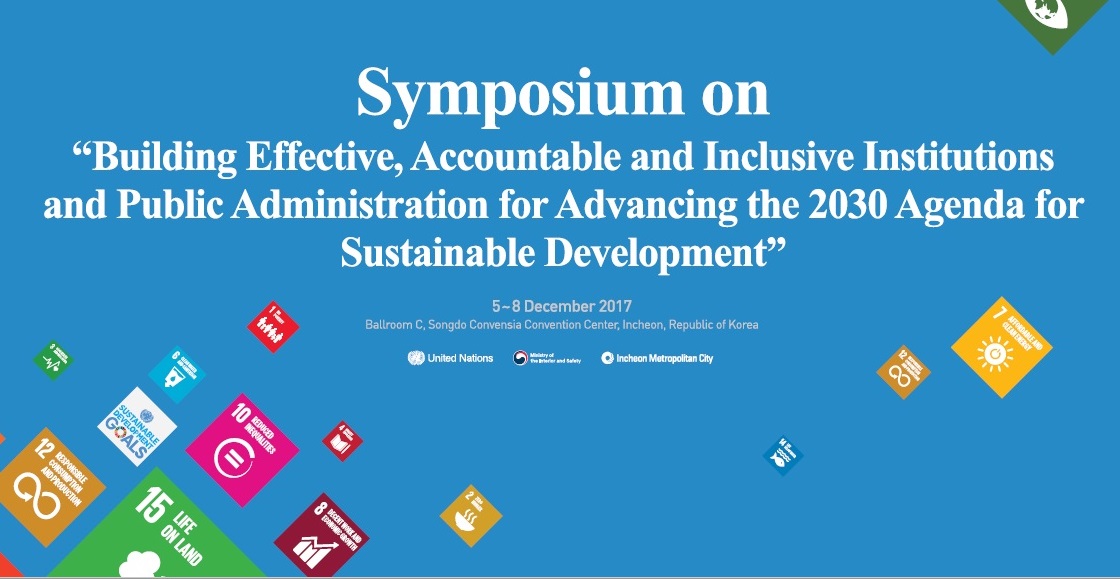Regional Symposium

The Division for Public Institutions and Digital Government (DPIDG) of the UNDESA, through its Project Office on Governance (UNPOG), in collaboration with the Government of the Republic of Korea organizes the annual Symposium for the Asia-Pacific region for the purpose of strengthening the capacity of the public administration and promoting innovation for advancing the 2030 Agenda for Sustainable Development.
The ultimate objective of the annual Symposium is to strengthen capacity of governments to build institutions at the national and local levels to support SDG implementation, promote innovation for inclusive service delivery, and strengthen government capacity to develop open innovation systems to engage societies in designing, delivering and implementing policies and build effective partnerships.
The Symposium provides a good platform for participants to identify good practices and ideas and enhance cooperation between countries, between central and local governments and among all stakeholders. It includes discussions on improving public institutions and public services delivery, actions for localizing the SDGs, the impact of frontier technologies on the public sector, engaging all stakeholders, particularly civil society organizations and the private sector, enhancing means of implementation, as well as adapting plans and policies to the SDGs and different national contexts.
UNPOG is organizing the first Regional Symposium in December 2017.
General Information
INTRODUCTION
Symposium on “Building Effective, Accountable and Inclusive Institutions and Public Administration for Advancing the 2030 Agenda for Sustainable Development”
Many governments in Asia and the Pacific have made good progress in implementing the Sustainable Development Goals (SDGs) since the adoption of the 2030 Agenda for Sustainable Development at the United Nations in September 2015. Many have been adapting the SDG targets to their national circumstances and priorities and incorporating them in their policies and development plans. Many are mobilizing and adapting their institutions, engaging local governments, parliaments and other actors; and identifying follow-up and review structures.
The SDGs, as an ambitious integrated framework, call for whole-of-government and whole-of-society approaches and many countries have been moving in this direction. Good practices, lessons and challenges are already emerging from those implementation efforts. These were discussed at the United Nations High-Level Political Forum on Sustainable Development (HLPF) in July 2016 and July 2017 when 65 countries carried out voluntary national reviews (VNRs). The 2017 HLPF concluded with the Ministerial Declaration, particularly calling for the need to take appropriate action towards localizing and communicating the SDGs at all levels, from the national to the community and grassroots level.
The United Nations Department of Economic and Social Affairs (UN DESA) (Division for Public Administration and Development Management (DPADM) has already organized two regional Symposia on the theme of equipping public institutions for implementing the 2030 Agenda in March 2016 in Bolivia and in February 2017 for SIDS in the Bahamas. It is organizing a similar symposium with UN DESA’s Division for Sustainable Development, UNITAR, UNDP and La Francophonie in Addis Ababa on 11-13 December 2017.
Against this backdrop, DPADM/UNDESA, through its Project Office on Governance (UNPOG), in collaboration with the Government of the Republic of Korea, will organize a Symposium from 5 to 8 December 2017 on “Building Effective, Accountable and Inclusive Institutions and Public Administration for Advancing the 2030 Agenda for Sustainable Development”.
The ultimate objective of the Symposium is to strengthen implementation efforts and public governance for the implementation of the 2030 Agenda and enable governments to respond to the SDGs in innovative ways, drawing from the strategies that different countries are implementing and the related successes and challenges.
The Symposium will allow participants to identify good practices and ideas and enhance cooperation between countries, between central and local governments and among all actors. This will include discussing actions for localizing the SDGs, improving public institutions and public services delivery, engaging all stakeholders, particularly civil society organizations and the private sector, enhancing means of implementation, as well as adapting plans and policies to the SDGs and to national situations.
- 5-8 December 2017
- Songdo Convensia Conference Center
- Contact Information
G-Tower 175, Art center-daero,
Yeonsu-gu, Incheon, Republic of Korea
Tel : +82 32 859 8600
Fax : +82 32 859 8803
Email : ewijeong.jeong@un.org


